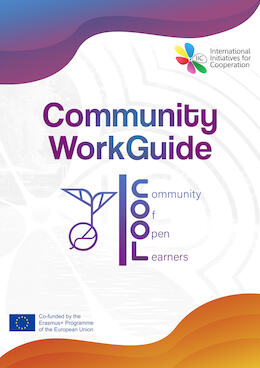Toolbox — For Training and Youth Work
All new tools in your inbox: Be the first to know about new tools for learning with our e-mail notifications.
Manual
Community WorkGuide
Community WorkGuide was developed by Association "International Initiatives for Cooperation" (IIC) whitin “Community Of Open Learners” (COOL) project, a 3 years Large Scale EVS project, financed by Erasmus + programme.
Aims of the tool
The purpose of the guide is to make widely available all the methods used to work with the local community and its diverse target groups as well as to enable other youth workers to apply in their work the described activities, experiments and role-play games. Another important aim of the tool is to promote non-formal learning and education as an effective method for leading intergenerational and intercultural communication on local level. It also shares and provides ideas how to mobilise and activate the local community.
During the three years of implementation of the project activities the volunteers created a lot of games, exercises and creative tools for development and helped the local community become familiar with non-formal education. Beneficiaries of the project were children, students of all ages, parents, people with disabilities, representatives of the local community who were involved in our activities, elderly people, NGO members and representatives of local institutions.
Description of the tool
The association “International Initiatives Cooperation’’ (IIC), Bulgaria had been implementing the Community Of Open Learners (COOL) project for 3 years. Over that period, the project hosted 24 youngsters from all over Europe, Caucasus and Middle East for the periods of six or twelve months. The project was implemented on the territory of the Municipality of Razlog. Thus, the group conformed by volunteers was dynamic and changed over the time, but it always remained rich in mixed cultures and nationalities. This was a great challenge for the volunteers and the IIC staff, but it had also resulted in a remarkable improvement of their skills and has significantly impacted their personal and professional development.
The aim of the project was to provide opportunities to the volunteers to work with kids, pupils, youngsters and with representatives of the local community who could be interested to be involved in the interactive clubs and classes (language and culture classes, dance classes, art clubs, music classes, martial art clubs, yoga and aerobic classes, ecology education, etc.)
The task of the volunteers was to organise attractive activities for the school students, children and youngsters from the region using non-formal learning methods as well as interactive clubs and classes which have attracted representatives from the other age groups of the local community. The volunteers also organized courses and clubs for all other interested representatives of the community. Diverse activities were regularly prepared for people with disabilities – art, music and dances, interactive games, English classes, etc. The volunteers also enjoyed time with elderly people by cooking, crafting, sharing cultural experience and playing traditional leisure games. As the voluntary service in Bulgaria is not so popular, the volunteers had also managed to promote and disseminate information about the volunteerism and the "Erasmus+" program among school students, youngsters and university students. The dissemination of the information was made using online methods and personal meetings. The volunteers had also acquired and enriched their knowledge to work with various software products, programs and information sources in the field of education and promotion. The activities of the project aimed to help to develop a sense of initiative and social responsibility in the participants. The communication between the volunteers and the target groups, addressed by the project, changed their worldview and the way of thinking and it showed them the benefits of intercultural communication and enriched their knowledge on topics like social inclusion, peaceful co-existing, volunteering, accepting diversities and managing values. At the same time, the volunteers were satisfied that they managed to diversify the social life of the community in the town of Razlog and had influence on it in a positive way.
Through the participation in the activities which had been organised by the volunteers the local community had a chance to achieve personal and professional development through continuing and shared learning.
Available downloads:
Disclaimer
SALTO cannot be held responsible for the inappropriate use of these training tools. Always adapt training tools to your aims, context, target group and to your own skills! These tools have been used in a variety of formats and situations. Please notify SALTO should you know about the origin of or copyright on this tool.
Tool overview

http://toolbox.salto-youth.net/2920
This tool is for
Young people, children, students all ages, youth workers, youth leaders, NGO representatives, volunteers, representatives of the local community, elderly people.
and addresses
Intercultural Learning, Personal Development, Youth Participation
It is recommended for use in:
European Voluntary Service
Behind the tool
The tool was created by
International Initiatives for Cooperation
in the context of
"Community Of Open Learners" Project (COOL)
The tool has been experimented in
EVS
The tool was published to the Toolbox by
Kostadinka Todorova (on 21 October 2020)
and last modified
10 September 2020
Comments
No comments have been posted yet.
If you want to comment on this tool, you need to be signed in with your MySALTO account. Sign in now